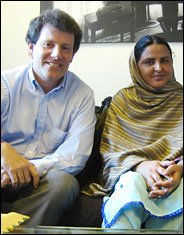An Awesome Story From Nicholas Kristof
 The New York Times
The New York TimesNovember 8, 2005
Op-Ed Columnist
The Rosa Parks for the 21st Century
By NICHOLAS D. KRISTOF
She may be the bravest woman in the world, but Mukhtaran Bibi was finally looking intimidated.
Mukhtaran is the Pakistani peasant woman who was gang-raped on the order of a local council, and then forced to walk home nearly naked before a jeering crowd. Instead of killing herself, as rape victims routinely do in such places, she prosecuted her attackers and became a women's rights leader in Pakistan.
But last week, she was confronted by something she found pretty scary: Midtown Manhattan.
Glamour magazine is honoring Mukhtaran as a "woman of the year." It flew her from Pakistan - first-class - to the U.S., where she met senior officials in the White House, the State Department and Congress.
At the Glamour banquet at Lincoln Center, Brooke Shields introduced Mukhtaran as a woman who "showed the world the real meaning of the word honor." Mukhtaran (who also goes by the name Mukhtar Mai) seemed a little stunned to receive two standing ovations from a huge crowd of whooping Americans.
Mukhtaran is, of course, an unlikely star of Glamour. She's a peasant living in a remote village who doesn't know her age (her mom says she was born in the winter, but no one knows what year). She is a devout Muslim who wears a head scarf, and while her photos adorn Glamour's December issue, her clothing-to-skin ratio may set an all-time high for the magazine.
While Mukhtaran is being feted here, it's easy to think that her problems are over. But they aren't. President Pervez Musharraf allowed her to make this visit, after blocking a trip by her in June and then kidnapping her when she protested, but Pakistani intelligence agents still follow her everywhere. Agents open or confiscate her mail and spread lies about her in the Pakistani press, and she is reported to be on a death list. At some point, her luck may run out - and her fame won't stop a knife or a bullet.
"I'm still very scared," she said. "I feel threatened."
Yet what sets Mukhtaran apart is not her suffering, but her effectiveness in bringing hope, education and new attitudes to rural Pakistan. Laura Bush got it just right in an eloquent video tribute to Mukhtaran at the banquet: "Please don't assume that it's only a tale of heartbreak. Mukhtaran ... proves that one woman really can change the world."
After prosecuting the rapists, Mukhtaran used the compensation money of $8,300 to start schools in her village because she thinks that education is the best way to overcome feudal attitudes. Girls from surrounding areas hike up to two hours each way to attend the school.
When I first met Mukhtaran, in her village, she was running out of money to keep the schools operating, her enemies were biding their time to murder her, and she was lonely and frightened - and unwavering.
Times readers responded with a torrent of contributions, more than $130,000, and Mukhtaran has used the money to improve the schools and "endow" them by buying cows, which will generate income to pay expenses. She has also bought an ambulance for the area and built a police station that provides security, and now she's preparing to build the first high school in the area, along with a clinic and a women's shelter. (If you want to help, please don't send money to me; contributions can be sent to either of these Web sites: www.4anaa.org and www.mercycorps.org.)
Not surprisingly, filmmakers are jostling to make a movie of her story. Mukhtaran turned a tale of gang rape into something that is actually inspiring.
The world lost Rosa Parks last month, but Mukhtaran is a Rosa Parks for the new century: a woman simultaneously ordinary and extraordinary, who transcended her role and started a broad movement for justice. The most pressing moral challenge today is to overcome the brutality and inequality faced by women and girls in the developing world, and Mukhtaran has become a leader of that struggle. I hope that we'll follow her, and that the U.S. will align itself with real Pakistani leaders like her.
Mukhtaran was in the fourth grade in her own school when I met her. So on this visit I asked her over pizza on West 43rd Street what grade she's in now.
"I've been too busy to go to school much," she said, embarrassed. "So I'm still in the same grade. ... But I do hope that eventually I'll get to high school."
Never mind. This is one fourth grader who can be a teacher for us all.




0 Comments:
Post a Comment
<< Home